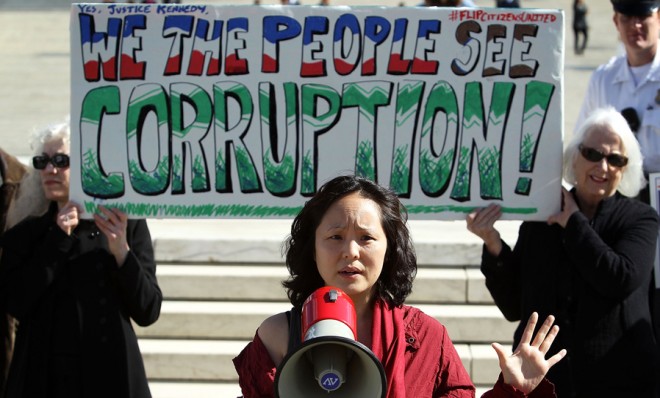The Citizens United myth
Why the case liberals love to hate is not the problem they think it is

Last week, Sens. Tom Udall (D-N.M.) and Jon Tester (D-Mt.) proposed a constitutional amendment — no, that was not a typo, they actually want to amend the United States Constitution — to overturn the Supreme Court's decision in Citizens United. Since the Supreme Court passed Citizens United in 2010 — allowing unrestricted political contributions from corporations, unions, and other organizations — liberals have howled about a supposed landslide of corporate cash into U.S. elections. But that simply hasn't happened.
To scrap Citizens United, the two senators hope to grant Congress (i.e. themselves) what amounts to unchecked power to determine how people may use their own money to fund politics. The idea is not entirely new. Udall has been proposing the amendment annually since the court handed down its decision, and the president has suggested amending the Constitution to overturn Citizens United.
Thankfully, the amendment has a zero percent chance of ever finding its way into our founding document. But the proposal reveals the depth of the liberal fascination with what I will describe as the Citizens United myth. For all the fear inspired by this myth, virtually every single piece of evidence that has come forth since the Supreme Court handed down its decision has suggested that liberal fears of Citizens United are a product of irrational fear rather than sound reasoning. Nevertheless, the Citizens United myth persists.
The Week
Escape your echo chamber. Get the facts behind the news, plus analysis from multiple perspectives.

Sign up for The Week's Free Newsletters
From our morning news briefing to a weekly Good News Newsletter, get the best of The Week delivered directly to your inbox.
From our morning news briefing to a weekly Good News Newsletter, get the best of The Week delivered directly to your inbox.
Politico's Byron Tau recently detailed the results of a survey of 151 PAC staffers from corporate and trade associations regarding the way they like to spend their money. As Tau noted, "[d]espite the fears of progressive activists in the post-Citizens United era, a new study finds that corporations are still very hesitant to embrace super PACs."
This should not stun anyone. Writing at FrumForum over three years ago, I more or less predicted that this would be the case, mostly because corporations, especially public corporations, have customers and shareholders from all different walks of life to worry about. The last thing they are interested in is being seen as a political symbol since politics is a 50-50 game and companies prefer to please all comers. An excerpt from what I wrote three years ago:
Does anyone really think that the CEO of a Fortune 500 is going to be stupid enough to fund campaign advertisements? Think about it logically. It's hard to imagine a more "Red" corporation than Wal-Mart. But consider the following facts: Each week, about 100 million Americans head to Wal-Mart to shop. A poll in 2004 found that 76% of voters that shop at Wal-Mart once a week voted for Bush. That's an astonishing margin. But that still means that 24% of Wal-Mart shoppers voted for someone else (23% said they voted for Kerry). If you do the math, if 100 million customers make it to Wal-Mart next week, 23 million might be liberals. If Wal-Mart runs an advertisement supporting a candidate or makes campaign contributions to a candidate, it runs the risk that the New York Times finds out about it, puts a story on the front page, and as a result, 23 million of their customers may take their business elsewhere. Not only that, if they contribute, and then lose, they have pissed off the other party unnecessarily. Tell me, what good does that do? [FrumForum]
There is plenty more evidence that pushes back against the theories that Citizens United has somehow turned our democracy into a sham. For instance, in a paper prepared for the 2012 annual meeting of the American Political Science Association, professors Timothy Werner (McCombs Business School, UT Austin) and John J. Coleman (University of Wisconsin — Madison) found "minimal effects for the overall campaign finance regulatory regimes in general and corporate and union independent expenditures specifically on public policy outcomes. These findings suggest that critics' fears about the possible effects of Citizens United at the national level may be overstated."
That finding was more or less echoed by Matt Bai in his excellent New York Times Magazine cover story exploring the real impact of Citizens United on our elections. As Bai put it, "if you're trying to understand what's really going on with politics and money, the accepted narrative around Citizens United is, at best, overly simplistic. And in some respects, it's just plain wrong."
A free daily email with the biggest news stories of the day – and the best features from TheWeek.com
Money plays an outsized role in politics, and that is a problem. But overturning Citizens United will not solve those problems. Let's re-focus on arriving at solutions that actually address our problems.
Jeb Golinkin is an attorney from Houston, Texas. You can follow him on twitter @jgolinkin.
-
 The best dark romance books to gingerly embrace right now
The best dark romance books to gingerly embrace right nowThe Week Recommends Steamy romances with a dark twist are gaining popularity with readers
-
 The ocean is getting more acidic — and harming sharks’ teeth
The ocean is getting more acidic — and harming sharks’ teethUnder the Radar ‘There is a corrosion effect on sharks’ teeth,’ a study’s author said
-
 6 exquisite homes for skiers
6 exquisite homes for skiersFeature Featuring a Scandinavian-style retreat in Southern California and a Utah abode with a designated ski room
-
 The billionaires’ wealth tax: a catastrophe for California?
The billionaires’ wealth tax: a catastrophe for California?Talking Point Peter Thiel and Larry Page preparing to change state residency
-
 Bari Weiss’ ‘60 Minutes’ scandal is about more than one report
Bari Weiss’ ‘60 Minutes’ scandal is about more than one reportIN THE SPOTLIGHT By blocking an approved segment on a controversial prison holding US deportees in El Salvador, the editor-in-chief of CBS News has become the main story
-
 Has Zohran Mamdani shown the Democrats how to win again?
Has Zohran Mamdani shown the Democrats how to win again?Today’s Big Question New York City mayoral election touted as victory for left-wing populists but moderate centrist wins elsewhere present more complex path for Democratic Party
-
 Millions turn out for anti-Trump ‘No Kings’ rallies
Millions turn out for anti-Trump ‘No Kings’ ralliesSpeed Read An estimated 7 million people participated, 2 million more than at the first ‘No Kings’ protest in June
-
 Ghislaine Maxwell: angling for a Trump pardon
Ghislaine Maxwell: angling for a Trump pardonTalking Point Convicted sex trafficker's testimony could shed new light on president's links to Jeffrey Epstein
-
 The last words and final moments of 40 presidents
The last words and final moments of 40 presidentsThe Explainer Some are eloquent quotes worthy of the holders of the highest office in the nation, and others... aren't
-
 The JFK files: the truth at last?
The JFK files: the truth at last?In The Spotlight More than 64,000 previously classified documents relating the 1963 assassination of John F. Kennedy have been released by the Trump administration
-
 'Seriously, not literally': how should the world take Donald Trump?
'Seriously, not literally': how should the world take Donald Trump?Today's big question White House rhetoric and reality look likely to become increasingly blurred